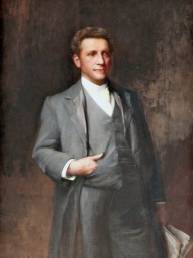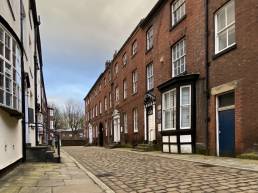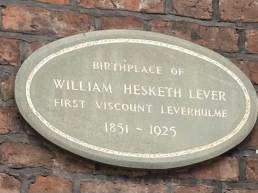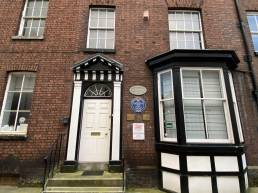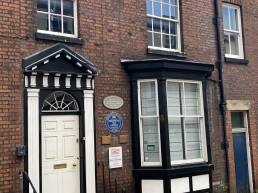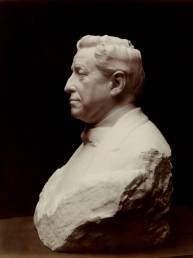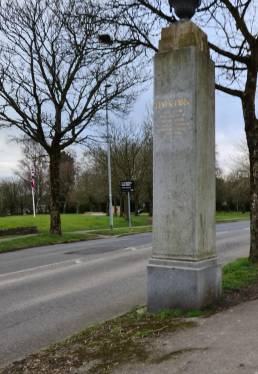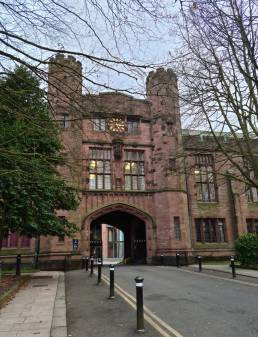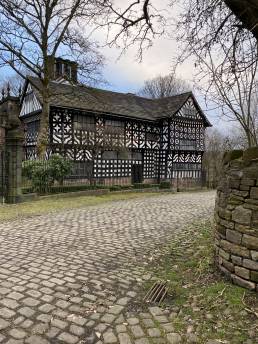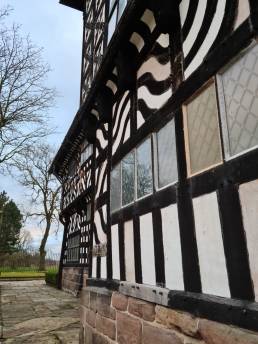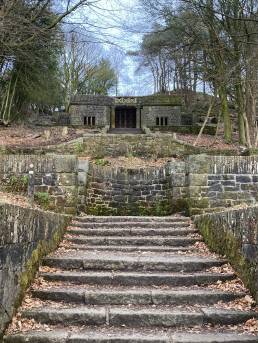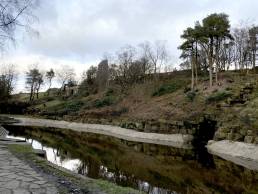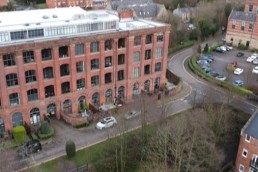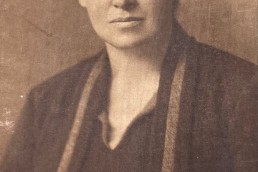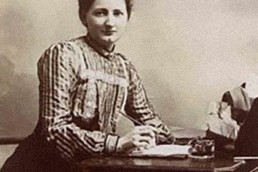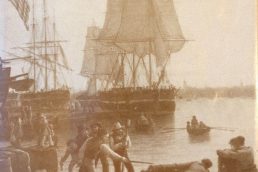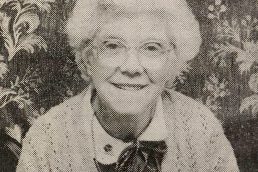This blog post examines the life and legacy of Bolton-born industrialist: the first Viscount Leverhulme. The post is informed by the work of Roger Hutchinson, Jules Marchel, and Clare Phillips, among those cited below.
The noted industrialist, the first Viscount Leverhulme was born at 16 Wood Street Bolton on the 19th of September 1851 as William Hesketh Lever. Leverhulme the eldest son of a non-conformist family of ten children was born to James and Ella Lever née Hesketh. James Lever was a partner in a retail and wholesale grocery business. At the age of fifteen, he was withdrawn from school and was set to work as an apprentice in the family business. This was no slight on Leverhulme himself, as it was an accepted pattern for the eldest son to become the heir to the family business, learning the trade from the bottom. At the age of sixteen Leverhulme was gifted a copy by his father of the Samuel Smiles’s Self Help (1859) . A passage in the book states that ‘useful and instructive though good reading may be, it is only one mode of cultivating the mind; and is much less influential than practical experience and a good example in the formation of character’ (Smiles, 1859). This book became the doctrine that Leverhulme lived his life by. As stated by Roger Hutchinson in The Soap Man, Lewis, Harris and Lord Leverhulme, ‘The genius of Smiles was not so much to blaze new philosophical trails as perfectly to express the half-formed principles of the Victorian working bourgeoisie. William Lever may have been among the most prominent men to credit Smiles with granting him a template for life’ (Hutchinson, 2003, p.32).
Leverhulme progressed quickly through the company ranks; he had begun within the company as a mere trainee paid at just a shilling a week. By the age of twenty-one he was adjudged to have learned enough about the business; Leverhulme was promoted to the role of junior partner and paid £800 per annum. As stated by Hutchinson ‘those were the wages of a prosperous young man. Eight hundred pounds in the 1870s would be worth almost £60,000 [per annum] today’ (Hutchinson, 2003, p.34).
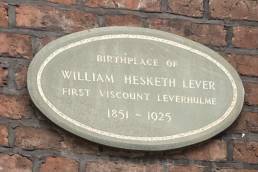

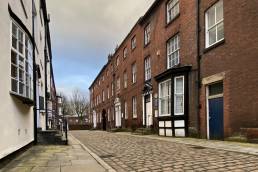

Leverhulme seized upon this idea of branding common day groceries. At this time, during the 1870’s groceries were sold unpackaged. As stated by Hutchinson “William Lever would make his astonishing fortune by seizing on one particular essential product, adding extra value to it at source, and transforming it through packaging and advertising from an unremarkable everyday item into an elixir of life, a symbol of leisure and luxury’ (Hutchinson, 2003, p.36). The initial idea for branding was a range of dairy products, quickly realizing the shortcomings of their limited shelf life, he changed direction and focused upon soap.
What Leverhulme needed now was a brand name. He instructed the Liverpool patent agent, W.P. Thompson, to devise a selection of names all of which Leverhulme initially rejected. On second inspection he focused on just one word. He made a hasty return to Liverpool to ask Thompson to patent the brand name ‘Sunlight’. In Leverhulme’s own words ‘I was all a tremble to have it registered, for fear someone else had got it’ (cited in Hutchinson, 2003, p.76).
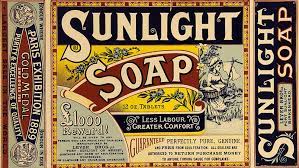

The design of the packaging was specifically marketed to appeal to the perceived buyer: women. Initially, Leverhulme simply bought in the soap and repackaged it. The brand name and marketing proved to be extraordinarily successful. The chosen brand seemed in tune with the times. Leverhulme was on to a sales winner. Thus, the natural progression was for Leverhulme to branch out and into the manufacture of his own soap. During 1885 Leverhulme commenced production in a rented factory in Warrington. The business and profits continued to grow, and very rapidly the factory relocated to a purpose-built facility in Port Sunlight in 1888. In 1890 the concern turned into a private company with an authorized capital of £300,000. The growth continued beyond all expected expositional growth.
Thus, during 1894 Lever Brothers Ltd went public with an introductory authorized capital of £1.5 million. After the death of his brother, Leverhulme soon became the sole Ordinary shareholder; this made him the sole policy maker for much of the rest of his life, with little or minimal input from the other directors. The brands Sunlight and Lifebuoy brought untold success for Lever Brothers Ltd and for Leverhulme personally.
It is not possible to recount this story without the mention of Lever Brothers and their business within the Congo. In 1911 Leverhulme set up a consortium named HCB, this was in conjunction with the Belgian Congolese government, with a shared aim to be moralistic and progressive employers. The idea was to harvest the raw materials of palm oil. In Lord Leverhulme’s Ghosts, Colonial Exploitation in the Congo, Jules Marchel exposes the working conditions in which the native Congolese were conscripted to work. Profit was put over any compassion; the only aim was to increase profit with working conditions and pay being derisory. Leverhulme, as the face of Lever Brothers, is clearly seen to be at the heart of setting up the plantations: ‘Lever invested whatever capital was needed to equip his Congolese project with modern machinery. A thousand tons of such machinery were dispatched from Liverpool to Matadi in the summer of 1911, for the equipping of a factory at Lusanga, now renamed Leverville, and situated at the confluence of the Kwilu and Kwange rivers’ (Marchel, 2017, p.60). Leverhulme visited during 1912 and again during 1913. When the take up of workers to the plantations was poor, the HCB regime simply conscripted sixty-eight thousand workers by force, of which over seven thousand died. The Socialist Review states ‘every block of soap [produced] had blood on it’ (Kimble, 2008, p.328). However, it can be argued that Leverhulme’s orders and indeed ideology were not fully represented at ground level in the Congo. Leverhulme was let down by the simultaneous greed and avarice of Lever Brothers employees and that of the Belgian Government who simply turned a blind eye to the suffering. Leverhulme, as stated by Claire Phillips in Hubris and Colonial Capitalism ‘passionately believed that paid labour alongside the schools, hospitals and rations his company promised to provide would attract workers’ (Phillips, 2017, p.202). It appears that Leverhulme was not specifically aware of any maltreatment.
Leverhulme was a paternalistic employer: he set up a model garden village for his employees at Port Sunlight, where he tried to instil middle-class values into his workers. Indeed, the major thoroughfare through the estate is called Bolton Avenue, with the road in front of the Lever Brothers headquarters entitled Wood Street. Bolton was never far from Leverhulme’s mind.
To that end, he made many generous benefaction gifts to Bolton during his lifetime. These still shape and define Bolton many years after his passing in 1925. Bolton School was the recipient of a £100,000 gift in 1912. Hall I’th Wood, which was the home of the inventor Samuel Crompton, was purchased, restored, and fitted out as a museum and given to the people of Bolton in 1899. Lever Park was laid out and given to the people of Bolton along with paintings and works of art to furnish several public galleries. The grounds of his Bolton home, ‘The Bungalow’, which occupied the shadow of Rivington Pike, still fascinates and enthrals walkers many years after the house was demolished in 1947. In 2017 The Rivington Terraced Gardens Trust obtained the lease of the grounds from United Utilities and have since undertook many reparatory works. They have an excellent resource to outline their future plans, here.
Bibliography
Fildes, L., (n.d.) William Hesketh Lever, Later 1st Viscount of Leverhulme. [Online] Artuk.org. Available at: <https://artuk.org/discover/artworks/william-hesketh-lever-later-1st-viscount-of-leverhulme-102510> [Accessed 20 March 2021].
Hutchinson, R. (2003) The Soap Man; Lewis, Harris and Lord Leverhulme. Edinburgh: Birlinn.
Kimber, C. (2008) Review of Lord Leverhulme’s Ghosts. [Online] Socialist Review. Available at: <http://socialistreview.org.uk/328/lord-leverhulmes-ghosts> [Accessed 20 March 2021].
Lewis, B. (2008) ‘So clean’ Lord Leverhulme, soap and civilization. Manchester: Manchester University Press.
Marchal, J. (2017) Lord Leverhulme’s ghosts. London: Verso Books.
Phillips, C. (2017) Hubris and colonial capitalism in a “model” company town. The case of Leverville, 1911-1940 – Benoît Henriet. [online] Comparing the Copperbelt. Available at: <https://copperbelt.history.ox.ac.uk/2017/10/02/hubris-and-colonial-capitalism-in-a-model-company-town-the-case-of-leverville-1911-1940-benoit-henriet/> [Accessed 20 March 2021].
Readyhough, G. (1982) Bolton town centre. Manchester: Neil Richardson.
Bolton.gov.uk. (2008) Silverwell St & Wood St Conservation Area. [Online] Available at: <https://www.bolton.gov.uk/downloads/file/892/silverwell-street-wood-street-conservation-area-appraisal> [Accessed 20 March 2021].
Smiles, S. (1859) Self-help. Champaign, Ill.: Project Gutenberg.
Smith, M. (1984) Leverhulme’s Rivington. Chorley, Lancashire: Nelson Brothers Printers.
Wood, F. (1916) Lord Leverhulme. Royal Academy of Arts. [Online] Royalacademy.org.uk. Available at: <https://www.royalacademy.org.uk/art-artists/work-of-art/lord-leverhulme> [Accessed 20 March 2021].
Unilever UK & Ireland. (2021) 1885 – 1899: Product innovation, 19th-century style. [Online] Available at: <https://www.unilever.co.uk/about/who-we-are/our-history/1885-1899.html> [Accessed 23 March 2021].
Bibliography
Colby, Robert A. (1985) “Tale Bearing in the 1890s: The Author and Fiction Syndication”. Victorian Periodicals Review. Vol.18, No.1, pp. 2-16.
Hilliard, Christopher (2009) “The Provincial Press and the Imperial Traffic in Fiction, 1870s-1930s”. Journal of British Studies. Vol.48, No.3, pp. 653-673.
Johanningsmeier, Charles (1995) “Newspaper Syndicates of the Late Nineteenth Century: Overlooked Forces in the American Literary Marketplace”. Publishing History. Vol. 37, No.1, pp. 61-82.
Jones, Aled (1984) “Tillotson’s Fiction Bureau: The Manchester Manuscripts”. Victorian Periodicals Review. Vol.17, No.1, pp. 43-49.
Singleton, Frank (1950) Tillotson’s 1850-1950: Centenary of a Family Business. Bolton: Tillotson & Son Ltd.

